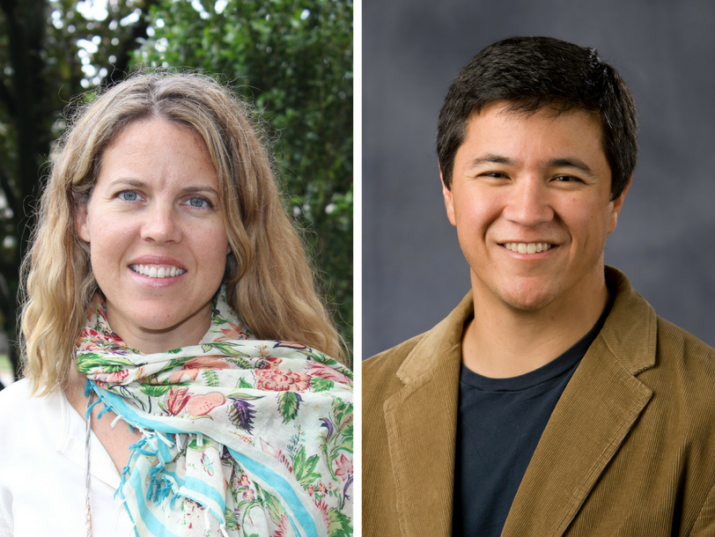
Megan Huchko and William Pan are among the seven groups of Duke faculty members to receive grant funding to establish new multidisciplinary collaborations.
Published February 21, 2017, last updated on February 28, 2017 under Research News
With funding from Duke’s Provost and Vice Provost for Interdisciplinary Studies, two Duke Global Health Institute (DGHI)-led teams have initiated new multidisciplinary collaborations.
Megan Huchko, associate professor of obstetrics and gynecology and global health, will lead a team focused on developing an intellectual community at Duke to identify technologies, programs and health policy changes that can address disparities in reproductive tract cancer outcomes in women worldwide.
Another team, led by William Pan, assistant professor of global environmental health, will explore the planetary health initiative in the context of other movements across other disciplines, to identify steps Duke should take to address interdisciplinary challenges in science, policy and global sustainability.
Fostering Collaborations at Duke to Address Global Cancer Disparities
Breast and cervical cancer are the two leading causes of cancer-related death in all countries in Africa, and both have significantly worse outcomes in these countries than in the United States and other high income countries. These disparities share some common root causes, including poor health care infrastructure, lack of awareness of early signs of cancer, lack of funding and limited technology.
An interdisciplinary team of Duke researchers, led by Huchko, believes these challenges can be addressed through innovation and adaptation of successful interventions that fit the target community, align with the priorities of local governments and are low-cost and cost-effective.
To achieve this, they say, clinicians and researchers must partner with policy experts and program implementers to ensure that effective interventions reach the target communities in a way that is sustainable and highly impactful.
To this end, the team will develop an interdisciplinary collaboration around four key questions:
- What are the criteria to define the highest impact interventions to address the health disparities related to reproductive tract cancers in Africa?
- Are there existing technologies, strategies or innovations that meet these criteria that would have significant impact on reproductive tract cancers if brought to scale?
- How can we bring existing or novel technologies in cancer prevention or treatment to scale?
- What would be most impactful policy or funding strategies to bring evidence-based innovations and cancer control strategies to populations that need them?
Their $5,000 grant will support regular meetings to discuss research and educational directions with students and trainees, co-sponsorship of a “Cervical Cancer in Africa” symposium and interdisciplinary brown bag lunch discussions focused on evidence and innovations in reproductive tract cancer work.
In addition to Huchko, the team includes:
- Nimmi Ramanujam, professor of biomedical engineering and global health and director of the Center for Global Women’s Health Technologies
- Gita Suneja, associate professor of radiation oncology and global health
- Krishna Udayakumar, associate professor of global health and medicine and executive director of Innovations in Healthcare
- Gavin Yamey, professor of public policy and global health and director of the Center for Policy Impact in Global Health
Addressing Interdisciplinary Challenges in Science, Policy and Global Sustainability
In 2015, the Rockefeller Foundation-Lancet Commission on Planetary Health outlined several key challenges for developing improved response and policies for balancing issues that affect both humans and the environment, including:
- Improved governance structures to integrate social, economic and environment policies
- Redefining global targets that shift focus from human-centric to planetary-centric measures
- Improved research to better quantify social and environmental impacts on health
A new collaboration led by Pan—and comprised of Duke experts in policy evaluation, One Health, economics, medicine, engineering and social cognitive behavior—will examine the relationship between human health and quality of natural ecosystems through the lens of planetary health. Their goal is twofold:
- Identify recent social science research on conservation interventions that affect human health
- Develop proposals for case studies related to impact evaluation and non-market evaluation that can help guide future interdisciplinary research on conservation and human health
They believe that research guided by these propositions will enable stakeholders to determine how ecosystem-mediated strategies for health promotion compare with more conventional biomedical prevention and treatment strategies for safeguarding human health.
With their $5,000 grant, the team will hold several core group meetings in 2017. They’re also considering convening a year-end seminar on planetary health that can, in addition to the case studies, help inform future educational, research and infrastructure strategies at Duke.
In addition to Pan, the team includes:
- Marc Deshusses, professor of civil and environmental engineering and global health
- Gregory Gray, professor of medicine, environmental health and global health
- Brian Hare, associate professor of evolutionary anthropology
- Marc Jeuland, professor of public policy and global health and director of the Center for Policy Impact in Global Health
- Randy Kramer, professor of global environmental health and DGHI deputy director
- Subhrendu Pattanayak, professor of public policy, environment and global health
Learn about other recipients of this grant.


